On one hand, South Indian states have been complaining about denial of a proportionate portion of the sharable funds from the Centre, based on population.
On the other hand, they stand to lose Lok Sabha and Rajya Sabha seats that again are based on population, points out N Sathiya Moorthy.
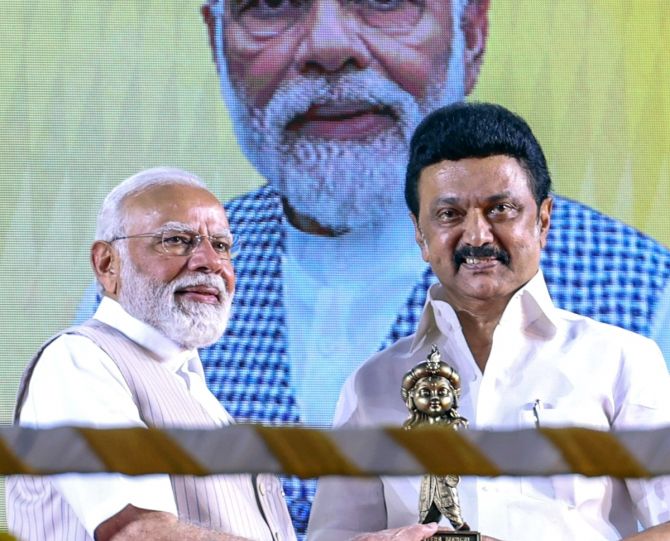
Now that the countdown has sort of begun for the Lok Sabha polls, anti-BJP ruling parties in at least three south Indian states -- Karnataka, Kerala and Tamil Nadu -- have revived politics divided on regional divide -- or, have they?
Even without it all, the Centre-state drift has only widened under the BJP-NDA regime since 2014 despite Prime Minister Narendra Modi spelling out 'cooperative federalism' as the corner-stone of his politico-administrative policy nearer home, which was rather very long ago by current reckoning.
All three states have issues with the Centre's sharing of federal funds through GST and other means with the states.
Other states too have complained for some years now of how the BJP Centre was not disbursing their share from the collective pool on time.
But south Indian states, including Telangana and Andhra Pradesh, the former now being ruled by the BJP's Congress rival, have another problem.
So has Maharashtra, the nation's richest state with most top industrial houses having their registered offices mainly in capital Mumbai.
Independent of party affiliations, for decades now, south Indian states, especially the three named, and more so, Kerala and Tamil Nadu, have been charging the federal arrangement with penalising them for their good work on economic growth and population control.
Karnataka MP D K Suresh even told Parliament that no one should be surprised if the southern states wanted to go on their own.
Naturally, it raised hackles in ruling BJP circles, also because Suresh is Karnataka Deputy Chief Minister D K Shivakumar's brother.
Ruling party MPs lost no time in castigating Suresh for his 'anti-national, separatist' comment.
But from an apolitical standpoint down South, there were supporters and more so silent sympathisers.
That was because Suresh was echoing popular sentiments, especially in Kerala and Tamil Nadu for over four decades.
There are twin elements. Both are population-centric.
On one hand, they have been complaining about denial of a proportionate portion of the sharable funds from the Centre, based on population.
On the other hand, they stand to lose Lok Sabha and Rajya Sabha seats that again are based on population.
The decennial Census, delayed because of the Covid pandemic, will follow the Lok Sabha polls, and delimitation of constituencies will follow in 2026.
The last time population-centric revision of Lok Sabha seats were worked out unofficially, Tamil Nadu was to lose seven seats from the existing 39 and Kerala, five from 20. That was three decades ago.
Now, both states have a lower population growth rate than in the past and thus the writing is clearly on the wall for them both.
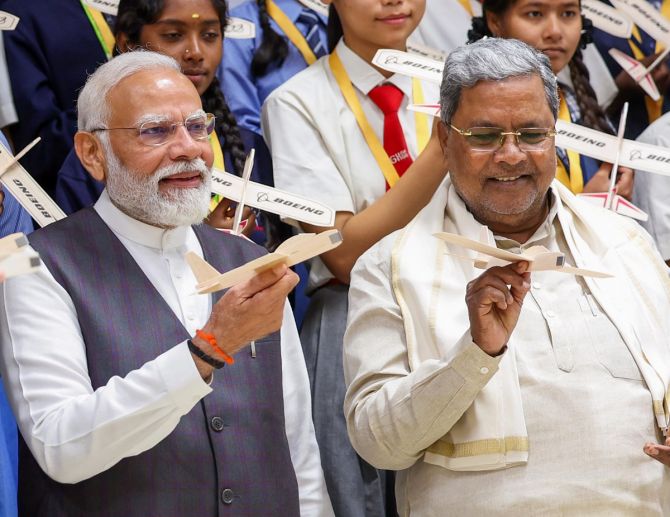
What makes the south Indian states, and a silent or not-so-silent section of the population, upset about the functioning of the federal scheme is this.
Owing to un-arrested or relatively less-faithfully enforced population-= control measures, north Indian states have managed a higher population growth rate -- thus getting more central funds and more Lok Sabha/Rajya Sabha seats after the upcoming decentralisation.
No one has specified it as yet, but demands like the previous one that successive central governments had acted upon in the past may come up this time, too.
On those occasions, Parliament passed laws to freeze the number of Lok Sabha/Rajya Sabha and assembly/council seats at the existing number with only delimitation work undertaken for an even distribution of population across constituencies in the same state.
But the same cannot be said of finances. As ruling DMK leaders have been arguing, Tamil Nadu now gets only 29 paise for every rupee that the state pays as taxes to the Centre, or the central pool.
When the issue was raised repeatedly in Parliament this time more than any time during the recent past, Finance Minister Nirmala Sitharaman reeled out figures to show how over successive years, the state has been receiving more funds from the Centre than in previous year(s).
This was when the argument was not about annual allocations, but about the state's share of the central funds as a share of taxes and duties paid to the central pool from Tamil Nadu.
The two are different issues, but the Centre, DMK leaders say, was obfuscating the real issue.
The recent short duration Budget session of Parliament thus witnessed the chief ministers of Kerala, Pinarayi Vijayan (CPI-M) and Karnataka's Siddaramaiah (Congress) leading separate protests in the capital over the fund-sharing issue.
DMK MPs had their own protests, all of them separately, but each of them also sent representatives to the other two.
The Kerala government has also moved the Supreme Court in the matter, where other non-BJP states too are expected to implead themselves.
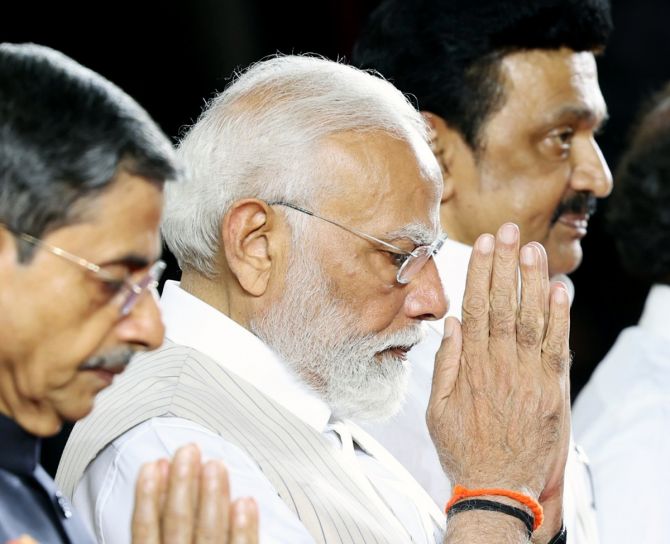
With or without the Lok Sabha polls, the Tamil Nadu assembly in its short-duration maiden session for the year passed two resolutions -- one against the Centre's delimitation move and another against the not-so-very-frequently discussed 'one nation, one vote' idea, for simultaneous polls to the Lok Sabha and all state assemblies all at once.
Interestingly, the Opposition AIADMK backed the delimitation resolution and reserved its decision on the other for another day.
In a rare decision, the Centre made former President Ram Nath Kovind to chair what essentially was a political panel to hear out people and parties on the simultaneous polls issue and come up with its recommendations.
In a way, it is a feeble attempt to capitalise on Modi's personal charisma, where guaranteed victory in the Lok Sabha polls (as assumed) should make it a smoother drive in most if not all states.
In the past, during the Emergency, the authorless, ownerless 42nd Amendment draft proposed a presidential form of government, to sweep the nation under then prime minister Indira Gandhi's charismatic leadership.
In the 1990s, the BJP-NDA had mooted the idea within inner circles, to capitalise on then prime minister Atal Bihari Vajpayee's greater acceptance level than anyone from the collective Opposition.
There was no knowing why the Congress did not pursue the idea during the Emergency (1975-1977) but the BJP Centre changed tack after losing parliamentary polls in crucial Hindi belt states.
Thus when Stalin declared elsewhere that Modi was treating states like municipalities for them to resort to market-borrowing more than already, had politics and reality rolled into one.
His taking Modi's name was politics but the denial of borrowing rights for states is entrenched in the DMK's founding principles that were later refined and defined in common man's language.
Thus party founder C N Annadurai's assertion of 'Vadakku vaazhgiradhu, therku theigiradhu' ('North is thriving, South is waning', in economic terms) was accompanied by a call for 'Maanilaththil suyatchi. maththiyil koottatchi' or 'Self-rule for the states, cooperation/coalition at the Centre.'
The DMK proposed the latter as a way out, and Stalin's father M Karunanidhi as chief minister in the 1970s appointed the Justice P V Rajamannar committee to study Centre-State relations.
The longest-serving chief justice of the Madras high court, Rajamannar was also the chairman of the Fourth Finance Commission.
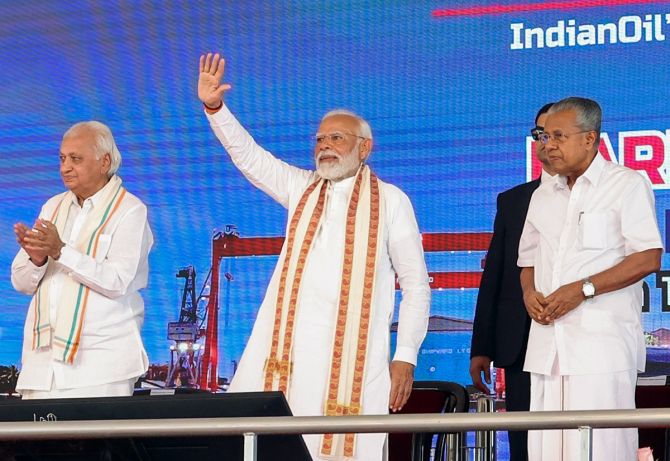
Hence, when Modi mouthed the phrase 'cooperative federalism', the DMK, which was then weak on that score after decadal transformation, hoped it would work.
Stalin has, however, found that such fond hopes have not borne fruit but has triggered new elements from independent non-Dravidian sources and background distanced from the founding days of the Dravidian movement in what they call the 1990s kids in the IT generation, now graduating to AI and more.
For the rest of the affected states, it's a real problem in terms of funds availability -- and when they want it -- as the Centre's dispersal of GST shares has been erratic even in these days of post-Covid economic recovery.
For Tamil Nadu it is also an ideological climbdown from the original 'separate Dravida Nadu' concept.
It was a way to integrate in the national mainstream and thus for national integration, too.
The underlying, unidentified strains thus have the potential for another Jallikattu kind of protests of January 2017.
On that occasion, multiple elements of the Tamil social identity merged in contemporary political realities where the state, the faceless organisers felt, was not getting its due, the respect due to an ancient civilisation, language and culture, but in the 21st century milieu.
They dig deep not only into history but also fiscal and economic status of states under the Union and draw conclusions that are at variance with whatever is being proffered by the BJP-ruled Centre.
Today, a situation has arisen when the ruling dispensations in Kerala and Tamil Nadu, West Bengal and Punjab, not to rule out Delhi, where regional governments have problems with the functioning and thinking of the gubernatorial appointees of the Modi dispensation in Opposition-ruled states.
They are all waiting for the way the governors handle the Congress governments in Karnataka and Telangana.
Telangana especially has the history of Governor Tamizhisai Soundararajan, and the previous chief minister K Chandrasekhar Rao took her to the Supreme Court, which also chided her.
The Tamil Nadu government has already moved the Supreme Court, which in turn advised Governor R N Ravi in so many words to fall in line with the spirit and also the letter of the Constitution.
He created a new issue possibly for himself when he walked out of the state assembly without reading the annual address, customarily prepared for him.
It was the second year in a row that he was doing it, and it will be for the Supreme Court to decide if a governor had the right to use his private opinion and ideological views, however conscientious, to check the veracity of a speech prepared by the elected government.
Even without it, Ravi and his Kerala counterpart Arif Mohamed Khan, a 'neo-convert' to the BJP brand of nationalism after his days in V P Singh's Janata Dal, have problems with their state governments. The reverse is true even more.
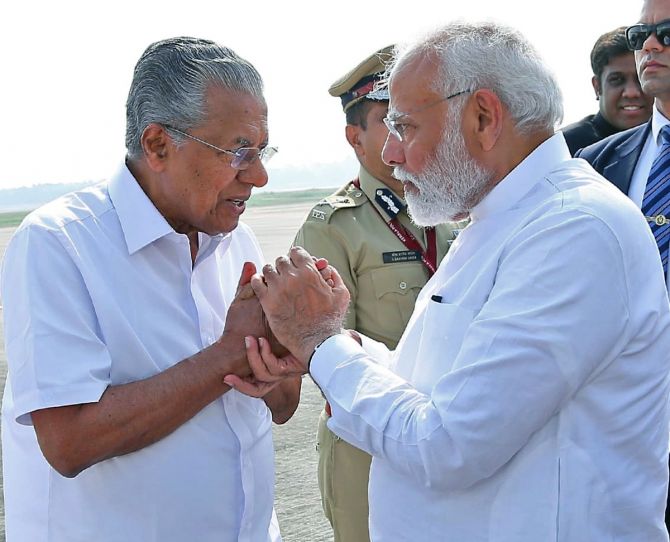
Now after the Supreme Court's decisive ruling in the 'electoral bonds case', the Opposition-ruled states are hoping for a clear-cut direction from the apex court on multiple matters affecting their relationship with the Union and the governors appointed by them.
It is much trickier than any other before the Supreme Court, now and earlier, but the outcomes in individual cases flowing from multiple 'federal issues' also have a medium and long-term impact on the politico-constitutional system that is called 'India that is Bharat'.
For his part, Stalin, from among the non-BJP, anti-BJP southern CMs, focussed more on 'federal issues' after carefully avoiding the term lest he should be misunderstood, and listed out what he qualified as the top 10 achievements of his 'Dravidian model' of government.
He cited the party's forgotten 'North-South' parable, and listed out how the South, especially Tamil Nadu, was in the top-rung, in terms of economic growth and contribution to the national kitty in GDP terms and otherwise, and also in education, healthcare and many other parameters.
'All this has been achieved despite facing severe financial crunch, challenges posed by national calamities' and what he termed as the 'step-motherly treatment... from the Union government'.
The chief minister praised his predecessor and AIADMK Leader of the Opposition EPS for joining hands with his government after the party's break-up with the BJP ally.
It is another matter that the BJP-friendly sections of local media, especially social media, have dubbed it all as a 'great conspiracy' against the party and its government at the Centre. It remains to be seen which of it gels with the voter.
After a point, trying to shout out Dravidian critics of the BJP and the Modi leadership as 'anti-nationals' and much worse, using the choicest epithets of the Hindutva brigade, may not work in the state.
It is also because the party has exhausted the stock by using them all against the Congress rival at the national level and the Nehru-Gandhi leadership over the past decade especially.
Instead, such attempts could prove counter-productive in Tamil Nadu. That is because from the very definition/interpretation of Hinduism, supremacy of language and culture, Tamil Nadu travels at a different plane, supposedly at a higher plane than the rest.
Outsiders are unable to comprehend it to be able to appreciate it, or even deprecate it effectively, but every such uninformed attempt only hardens grassroots-level views in the state.
It is not a healthy sign, yes. But it cannot be levelled in this NRI/NRT era of IT professionals, who abound in and from states like Tamil Nadu, through sloganeering and heckling, within and outside Parliament.
The BJP, if it hopes to rule the nation for a longer period than already, should devise new and more appropriate ways. They can start by shedding at least a part of their 'north superior' mindset or the impression that they end up giving others in the matter.
N Sathiya Moorthy, veteran journalist and author, is a Chennai-based Policy Analyst and Political Commentator.
Feature Presentation: Rajesh Alva/Rediff.com

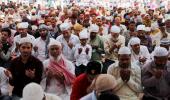




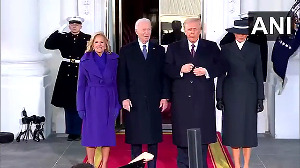
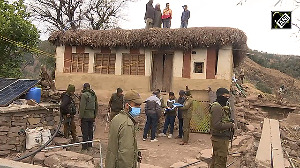
 © 2025
© 2025